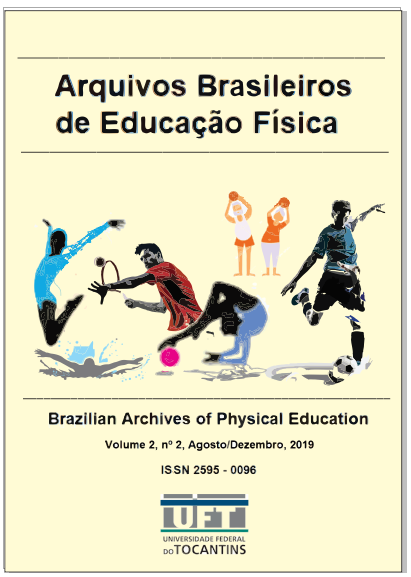Influência das artes marciais nos níveis de raiva e agressividade em crianças e adolescentes: revisão sistemática
DOI:
https://doi.org/10.20873/abef.2595-0096.v2n2p55.2019Keywords:
Exercício, Raiva, AgressividadeAbstract
O objetivo deste estudo foi sintetizar os achados dos estudos sobre a influência das artes marciais nos níveis de raiva e agressividade em crianças e adolescentes. Trata-se de uma revisão sistematizada realizada em duas bases de dados (PUBMED e LILACS/BVS) e nas referências dos artigos incluídos. Foram utilizados 17 descritores na língua inglesa, sendo incluídos apenas estudos experimentais. De 79 artigos identificados nas buscas cinco foram incluídos na revisão. Três estudos foram feitos com crianças e os outros dois com adolescentes. Observou-se que seis instrumentos foram empregados, sendo que dois avaliaram indiretamente a agressividade, um avaliou diretamente a agressividade, dois avaliaram diretamente a raiva e um avaliou diretamente ambas. Os estudos incluídos na revisão evidenciam a influência das artes marciais nos níveis de raiva e agressividade. Pode-se concluir que as artes marciais parecem reduzir consideravelmente os níveis de raiva e agressividade em crianças e adolescentes.
References
Reynes E, Lorant J. Do competitive martial arts attract aggressive children? Percept Mot Skills 2001;93(2):382-6.
Lotfian S, Ziaee V, Amini H, Mansourina M-A. An analysis of anger in adolescent girls who practice the martial arts. Int J Pediat. 2011(7):1-5.
Ziaee V, Lotfian S, Memari AH . An 18-month follow-up of anger in female karatê athletes. Iran J Psychiatry. 2013;8(2):104.
Vertonghen J, Theeboom M, Pieter W. Mediating factors in martial arts and combat sports: an analysis of the type of martial art, characteristics, and social background of young participants. Percept Mot Skills. 2014;118(1):41-61.
Reynes E, Lorant J. Effect of traditional judô training on aggressiveness among young boys. Percept Mot Skills. 2002;94(1):21-5.
Nosanchuk TA, Lamarre BW. Judô training and aggression: Comment on Reynes and Lorant. Percept Mot Skills. 2002;94(3):1057-8.
Lamarre BW, Nosanchuk TA. Judô-the gentle way: A replication of studies on martial arts and aggression. Percep Mot Skills. 1999;88(3):992-6.
Ziaee V, Lotfian S, Amini H, Mansourina M-A. Anger in adolescent boy athletes: a comparison among judô, karatê, swimming and non athletes. Iran J Pediatr. 2012;22(1):9.
Fabio RA, Towey GE. Cognitive and personality factors in the regular practice of martial arts. J Sport Med Phys Fit . 2018;58(6):933-943.
Midgley SJ, Heather N, Davies JB. Levels of Aggression among a Group of Anabolic-Androgenic Steroid Users. Med Sci Law. 2001;41:309-314.
Tkacz Joseph, Young-Hyman D, Boyle CA. Aerobic exercise program reduces anger expression among overweight children. Pediatr Exerc Sci. 2008;20(4):390-401.
Greene AF, Sears Jr SF, Clark JE. Anger and sports participation. Psychol Rep. 1993;72(2): 523-9.
Skelton DL, Glynn MA, Berta SM. Aggressive behavior as a function of taekwondo ranking. Percept Mot Skills. 1991;72(1):179-182.
Lakes KD, Hoyt WT. Promoting self-regulation through school-based martial arts training. J Appl Dev Psychol. 2004;25(3):283-302.
Downs SH, Black N. The feasibility of creating a checklist for the assessment of the methodological quality both of randomised and non-randomised studies of health care interventions. J Epidemiol Commun H. 1998;52(6)377-384.
Trulson ME. Martial arts training: A novel “cure” for juvenile delinquency. Hum Relat.1986;39(12):1131-1140.
Fung ALC; Lee TKH. Effectiveness of Chinese martial arts and philosophy to reduce reactive and proactive aggression in schoolchildren. J Dev Behav Pediatr. 2018;39(5):404-414.
Reynes E, Lorant J. Competitive martial arts and aggressiveness: a 2-yr. longitudinal study among young boys. Percept Mot Skills. 2004;98(1):103-115.
Gouveia VV, Chaves CMCM, Peregrino RR, Branco AOC. Medindo a agressão: o Questionário de Buss-Perry. Arq Bras Psicol. 2008;60(3):92-103.
Downloads
Published
How to Cite
Issue
Section
License
Proposal for Copyright Notice Creative Commons
1. Policy Proposal to Open Access Journals
Authors who publish with this journal agree to the following terms:
A. Authors retain copyright and grant the journal right of first publication with the work simultaneously licensed under the Creative Commons Attribution License that allows sharing the work with recognition of its initial publication in this journal.
B. Authors are able to take on additional contracts separately, non-exclusive distribution of the version of the paper published in this journal (ex .: publish in an institutional repository or as a book), with an acknowledgment of its initial publication in this journal.
C. Authors are permitted and encouraged to post their work online (eg .: in institutional repositories or on their website) at any point before or during the editorial process, as it can lead to productive exchanges, as well as increase the impact and the citation of published work (See the Effect of Open Access).




